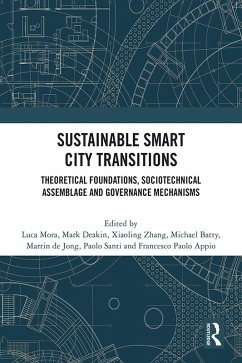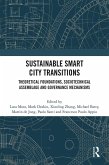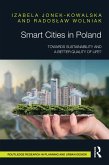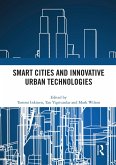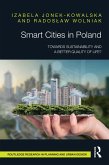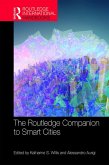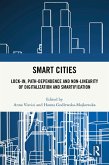Sustainable Smart City Transitions (eBook, PDF)
Theoretical Foundations, Sociotechnical Assemblage and Governance Mechanisms
Redaktion: Mora, Luca; Appio, Francesco Paolo; Santi, Paolo; Jong, Martin De; Batty, Michael; Zhang, Xiaoling; Deakin, Mark
42,95 €
42,95 €
inkl. MwSt.
Sofort per Download lieferbar

21 °P sammeln
42,95 €
Als Download kaufen

42,95 €
inkl. MwSt.
Sofort per Download lieferbar

21 °P sammeln
Jetzt verschenken
Alle Infos zum eBook verschenken
42,95 €
inkl. MwSt.
Sofort per Download lieferbar
Alle Infos zum eBook verschenken

21 °P sammeln
Sustainable Smart City Transitions (eBook, PDF)
Theoretical Foundations, Sociotechnical Assemblage and Governance Mechanisms
Redaktion: Mora, Luca; Appio, Francesco Paolo; Santi, Paolo; Jong, Martin De; Batty, Michael; Zhang, Xiaoling; Deakin, Mark
- Format: PDF
- Merkliste
- Auf die Merkliste
- Bewerten Bewerten
- Teilen
- Produkt teilen
- Produkterinnerung
- Produkterinnerung

Bitte loggen Sie sich zunächst in Ihr Kundenkonto ein oder registrieren Sie sich bei
bücher.de, um das eBook-Abo tolino select nutzen zu können.
Hier können Sie sich einloggen
Hier können Sie sich einloggen
Sie sind bereits eingeloggt. Klicken Sie auf 2. tolino select Abo, um fortzufahren.

Bitte loggen Sie sich zunächst in Ihr Kundenkonto ein oder registrieren Sie sich bei bücher.de, um das eBook-Abo tolino select nutzen zu können.
This book enhances the reader's understanding of the theoretical foundations, sociotechnical assemblage, and governance mechanisms of sustainable smart city transitions.
- Geräte: PC
- mit Kopierschutz
- eBook Hilfe
Andere Kunden interessierten sich auch für
![Sustainable Smart City Transitions (eBook, ePUB) Sustainable Smart City Transitions (eBook, ePUB)]() Sustainable Smart City Transitions (eBook, ePUB)42,95 €
Sustainable Smart City Transitions (eBook, ePUB)42,95 €![Smart Cities in Poland (eBook, PDF) Smart Cities in Poland (eBook, PDF)]() Izabela Jonek-KowalskaSmart Cities in Poland (eBook, PDF)40,95 €
Izabela Jonek-KowalskaSmart Cities in Poland (eBook, PDF)40,95 €![Smart Cities and Innovative Urban Technologies (eBook, PDF) Smart Cities and Innovative Urban Technologies (eBook, PDF)]() Smart Cities and Innovative Urban Technologies (eBook, PDF)42,95 €
Smart Cities and Innovative Urban Technologies (eBook, PDF)42,95 €![Smart Cities in Poland (eBook, ePUB) Smart Cities in Poland (eBook, ePUB)]() Izabela Jonek-KowalskaSmart Cities in Poland (eBook, ePUB)40,95 €
Izabela Jonek-KowalskaSmart Cities in Poland (eBook, ePUB)40,95 €![The Routledge Companion to Smart Cities (eBook, PDF) The Routledge Companion to Smart Cities (eBook, PDF)]() The Routledge Companion to Smart Cities (eBook, PDF)48,95 €
The Routledge Companion to Smart Cities (eBook, PDF)48,95 €![Smart Cities (eBook, PDF) Smart Cities (eBook, PDF)]() Smart Cities (eBook, PDF)166,95 €
Smart Cities (eBook, PDF)166,95 €![A Nordic Smart Sustainable City (eBook, PDF) A Nordic Smart Sustainable City (eBook, PDF)]() A Nordic Smart Sustainable City (eBook, PDF)0,00 €
A Nordic Smart Sustainable City (eBook, PDF)0,00 €-
-
-
This book enhances the reader's understanding of the theoretical foundations, sociotechnical assemblage, and governance mechanisms of sustainable smart city transitions.
Hinweis: Dieser Artikel kann nur an eine deutsche Lieferadresse ausgeliefert werden.
Dieser Download kann aus rechtlichen Gründen nur mit Rechnungsadresse in A, B, BG, CY, CZ, D, DK, EW, E, FIN, F, GR, HR, H, IRL, I, LT, L, LR, M, NL, PL, P, R, S, SLO, SK ausgeliefert werden.
Hinweis: Dieser Artikel kann nur an eine deutsche Lieferadresse ausgeliefert werden.
Produktdetails
- Produktdetails
- Verlag: Taylor & Francis eBooks
- Seitenzahl: 322
- Erscheinungstermin: 23. Februar 2022
- Englisch
- ISBN-13: 9781000540741
- Artikelnr.: 63095742
- Verlag: Taylor & Francis eBooks
- Seitenzahl: 322
- Erscheinungstermin: 23. Februar 2022
- Englisch
- ISBN-13: 9781000540741
- Artikelnr.: 63095742
- Herstellerkennzeichnung Die Herstellerinformationen sind derzeit nicht verfügbar.
Luca Mora is Professor of Urban Innovation at The Business School of Edinburgh Napier University, Scotland, UK, and at the Academy of Architecture and Urban Studies of Tallinn University of Technology (TalTech), Estonia. Mark Deakin is Professor of Built Environment at the School of Engineering and the Built Environment of Edinburgh Napier University, Scotland, UK. Xiaoling Zhang is Professor in the Department of Public Policy of City University of Hong Kong, China. Michael Batty is Bartlett Professor of Planning at University College London, where he chairs the Centre for Advanced Spatial Analysis (CASA). Martin de Jong is Professor at Erasmus School of Law and Rotterdam School of Management, Erasmus University Rotterdam, The Netherlands, and a Distinguished Visiting Professor at Fudan University, Shanghai, China. Paolo Santi is Principal Research Scientist at Senseable City Lab, Massachusetts Institute of Technology, Cambridge, MA, USA, and Research Director of the Institute of Informatics and Telematics, National Research Council, Pisa, Italy. Francesco Paolo Appio is Associate Professor of Innovation at SKEMA Business School, France.
Introduction - Assembling Sustainable Smart City Transitions: An Interdisciplinary Theoretical Perspective 1. Mapping the Knowledge Domain of Smart City Development to Urban Sustainability: A Scientometric Study 2. From "Smart in the Box" to "Smart in the City": Rethinking the Socially Sustainable Smart City in Context 3. Input- Output Modeling for Smart City Development 4. Digital Transformation of City Ecosystems: Platforms Shaping Engagement and Externalities across Vertical Markets 5. Strategic Planning for Smart City Development: Assessing Spatial Inequalities in the Basic Service Provision of Metropolitan Cities 6. How Are Smart City Concepts and Technologies Perceived and Utilized? A Systematic Geo- Twitter Analysis of Smart Cities in Australia 7. Exploring Smart City Project Implementation Risks in the Cities of Kakinada and Kanpur 8. Balancing Exploration and Exploitation in Sustainable Urban Innovation: An Ambidexterity Perspective toward Smart Cities 9. Quantifying the Spatio- Temporal Potential of Drive- by Sensing in Smart Cities 10. Understanding Ridesourcing Mobility and the Future of Electrification: A Comparative Study in Beijing 11. The Price of Privacy Control in Mobility Sharing 12. Building City Dashboards for Different Types of Users 13. Going Beyond the Smart City? Implementing Technopolitical Platforms for Urban Democracy in Madrid and Barcelona
Introduction - Assembling Sustainable Smart City Transitions: An Interdisciplinary Theoretical Perspective 1. Mapping the Knowledge Domain of Smart City Development to Urban Sustainability: A Scientometric Study 2. From "Smart in the Box" to "Smart in the City": Rethinking the Socially Sustainable Smart City in Context 3. Input- Output Modeling for Smart City Development 4. Digital Transformation of City Ecosystems: Platforms Shaping Engagement and Externalities across Vertical Markets 5. Strategic Planning for Smart City Development: Assessing Spatial Inequalities in the Basic Service Provision of Metropolitan Cities 6. How Are Smart City Concepts and Technologies Perceived and Utilized? A Systematic Geo- Twitter Analysis of Smart Cities in Australia 7. Exploring Smart City Project Implementation Risks in the Cities of Kakinada and Kanpur 8. Balancing Exploration and Exploitation in Sustainable Urban Innovation: An Ambidexterity Perspective toward Smart Cities 9. Quantifying the Spatio- Temporal Potential of Drive- by Sensing in Smart Cities 10. Understanding Ridesourcing Mobility and the Future of Electrification: A Comparative Study in Beijing 11. The Price of Privacy Control in Mobility Sharing 12. Building City Dashboards for Different Types of Users 13. Going Beyond the Smart City? Implementing Technopolitical Platforms for Urban Democracy in Madrid and Barcelona
